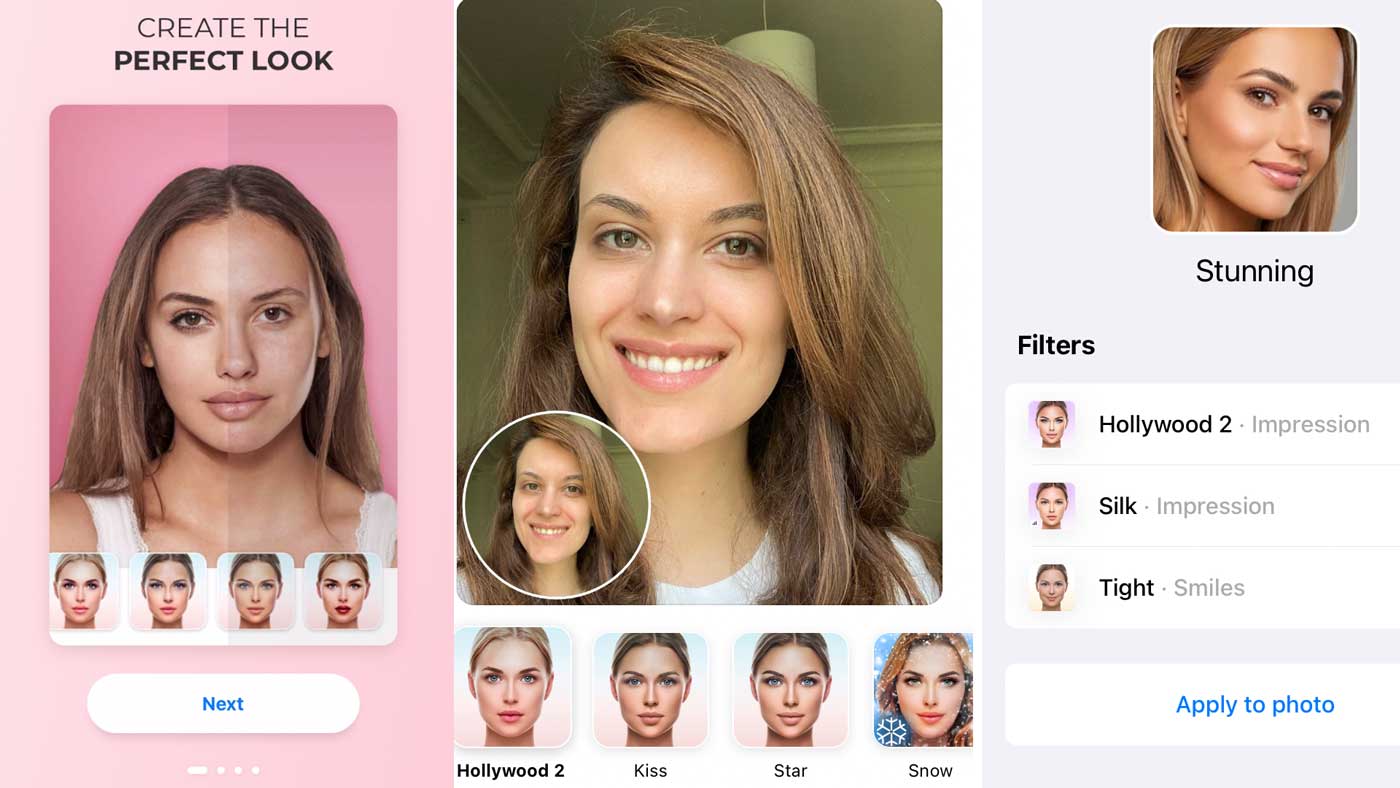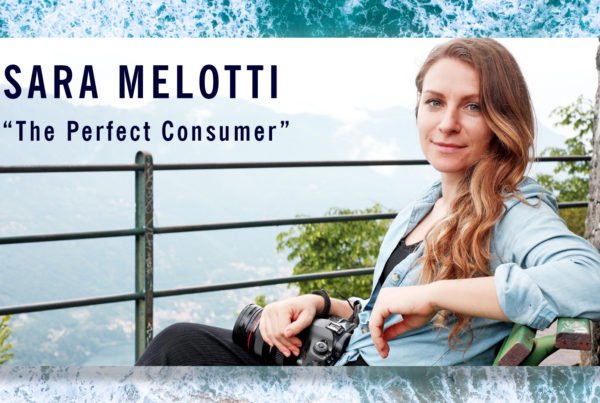Instagram vs. Reality? FaceApp and the uncanny world of photo editing apps
[/vc_column_text]Have photo editing apps turned us into illusionists?
A few years ago I came across a trending post on Reddit‘s homepage that showed how many young influencers on Instagram looked eerily alike – they seemed to be carbon copies of Kylie Jenner, aka the youngest sister of Kim Kardashian, who has cult-like following on social media.
I’ve been unable to find the original post, but it was a grid of 9 photos showing close-ups of nine young women, who seemed to have the same flawless skin, thick eyebrows, doe-like eyes, plump lips and high cheekbones. They looked like the same person but were in fact 9 different individuals.
Most of the comments on the original post lamented social media’s unattainable beauty ideals and the fact that young women seem pressured to look a certain way, resorting to lip fillers, Botox and cosmetic procedures to achieve that prized look. Writer Jia Tolentino wrote about this issue for The New Yorker in a piece titled “The Age of Instagram Face”.
Instagram… vs. Reality?
The Reddit community that showed that original post with 9 lookalikes was r/InstagramReality. Since discovering it, I would visit it from time to time for research for The Realists documentary, since body image and unattainable beauty ideals on social media will be a major part of the film.
This week, one of the most popular posts of Instagram Reality was “This account that post comparison of her without and with facetune to preach the word of not trusting social media“.
People in the comments section explained that the app this young woman used – to show the illusions of social media – was FaceApp.

So I looked it up, downloaded it and tried it.
Gullible Me
Using this app – and getting a glamorous makeover at the touch of a button – made me realize that the Kylie Jenner lookalikes mentioned earlier probably look nothing like Kylie Jenner in real life. They are simply using the same app to tweak their photos.
I felt so silly for believing them at face value (pun intended).
Also: Kylie Jenner in real life or in videos looks very different from the Kylie Jenner seen in photos. Ditto for her famous sisters.
If the subreddit Instagram Reality has taught me anything, it’s that you can easily unmask the illusions of social media by analyzing the difference between photos in one’s own feed and tagged photos (by others).
Tagged photos are one thing… and then there are videos. There is often a very stark difference between the way an influencer presents themselves on their (photo) feed versus how they look in videos, which are for now harder to retouch. Kylie Jenner and Khloe Kardashian are great examples of this.
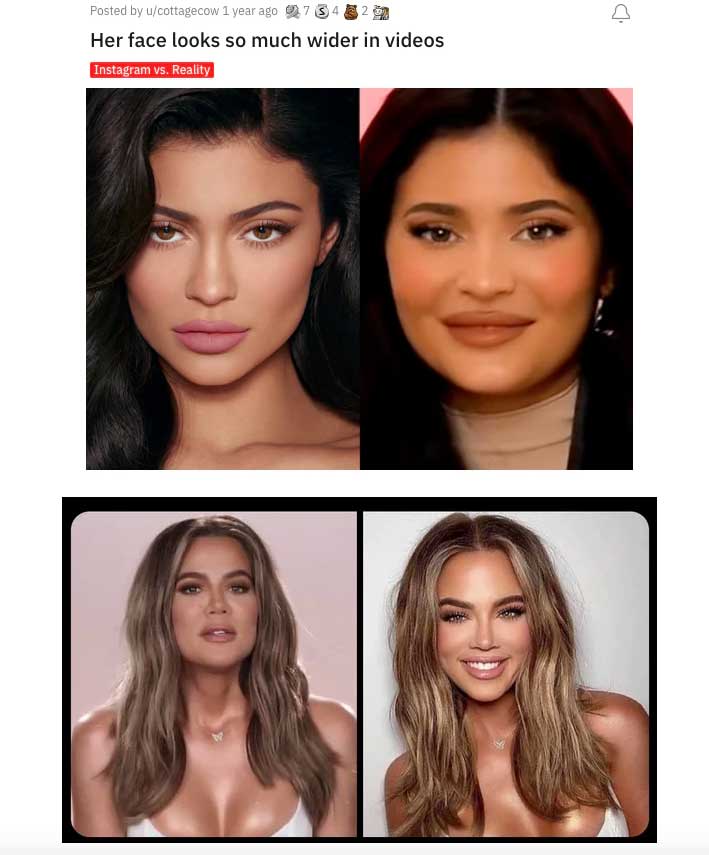
Using FaceApp on my photos
I was curious to see how FaceApp would change my looks with the aid of their famous AI system.
I downloaded the app, signed up for a free trial and two minutes later I got my answer.
My selfie – snapped without any make up on – was magically transformed at the touch of a button making me look like one of those Instagram influencers. The result was uncanny.
It was too easy. All I had to do was import the photo (no way I would give permission to the app to access my entire photo library) and click on the first item in its menu bar: “Presets.” I scrolled through them, selected “Stunning” and voilà – my photo was magically transformed.
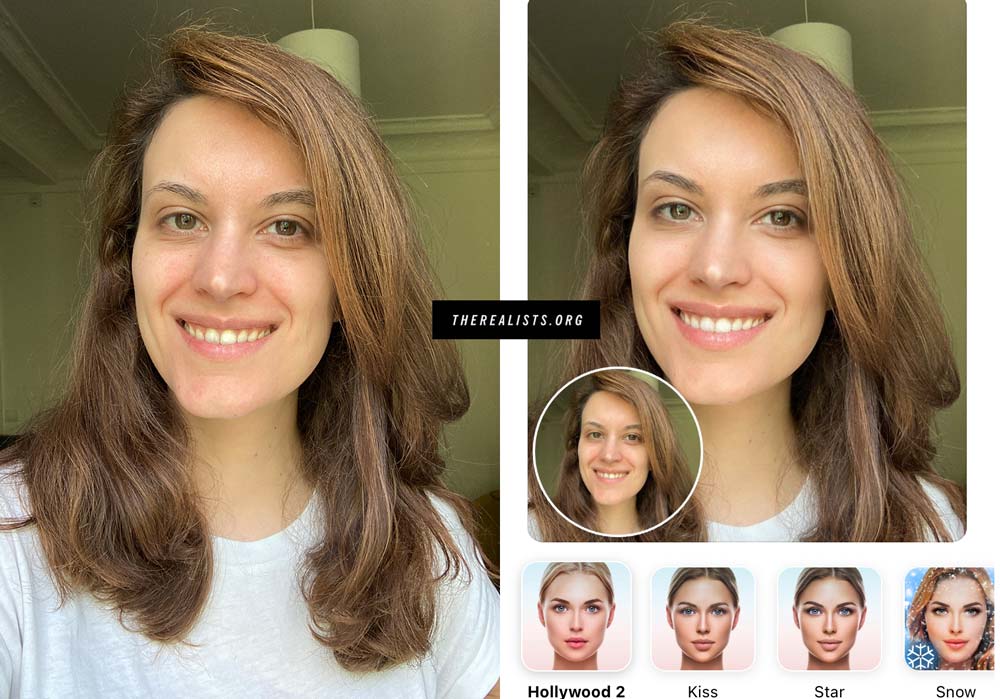
FaceApp has a “showcase” feature showing the before and after of the photo rendering: the before picture is framed in a small circle right below the beautiful, AI-improved pic. It seems to be taunting you, asking you to spot the difference and to think deeply about what would be needed – in terms of makeup and cosmetic procedures – to attain that more beautiful look. Because it’s there! It’s you! If only you worked a little harder at that.
You see, I had run the same experiment three years ago using the popular South Korean app SNOW. I had written about it for The Realists blog and that post proved to be so popular, it still receives hundreds of visits every month… and one of the photos from the blog post appears in Google cards results for SNOW.
But SNOW took work – and time! Every change had to be selected from a long menu and users had to pick the intensity of each tweak from 0 to 100.
FaceApp does everything for you at the touch of a button, in seconds. And it makes women look eerily similar.
It’s too fast and too easy.
This is really disturbing. A power nobody should have – especially young impressionable people for whom popularity on social media apps is key. Because what happens when young women look up from their phones and see their real faces in the mirror? Would they feel a sense of shame? Of inadequacy, for not looking like their AI-beautified version?
FaceApp & Men
I was curious to see what the app could do to a man’s appearance – someone many of us are familiar with.
Well, over the past month, my husband and I have been watching and greatly enjoying AppleTV’s limited series WeCrashed about the rise and fall of WeWork. Its charismatic founder Adam Neumann managed to walk away from the company he founded and almost destroyed with a golden parachute. As of 2022 he is worth 1.5 billion dollars. Neumann is a master illusionist, so I thought it’d be a fun exercise to see what he would look like if FaceApp improved his appearance.
I grabbed a royalty-free photo of Neumann on Wikipedia, transferred it to my phone, and got to play.
Interestingly, for men there are fewer presets. The “makeover” of Mr. Neumann looked interesting but subtle. I doubt it would cause him negative body image.
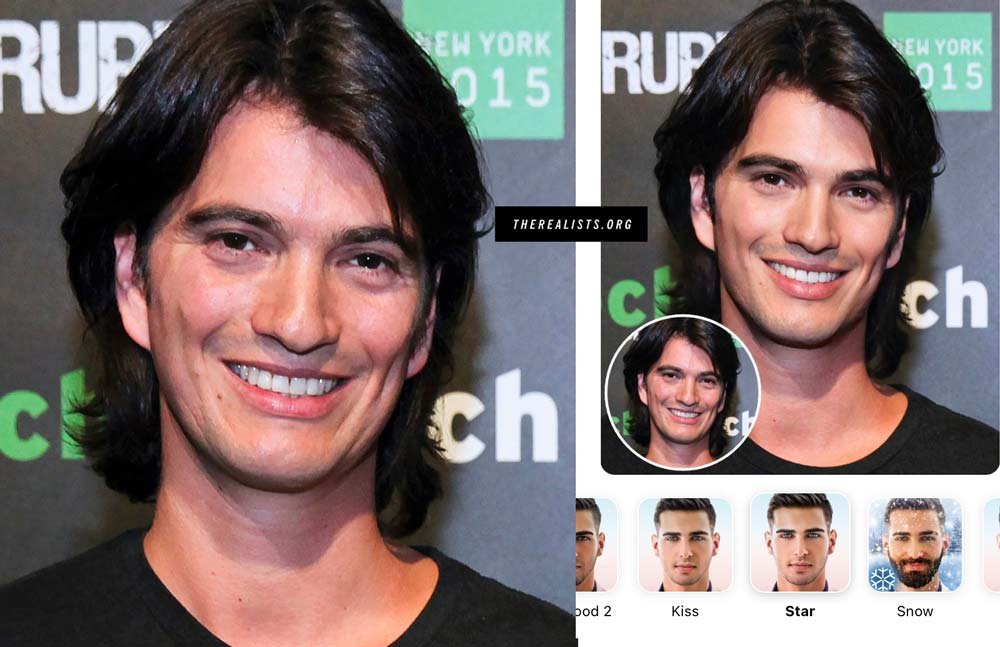
When I mentioned all of this to my husband, he astutely remarked that this is probably because FaceApp’s Artificial Intelligence system has been trained on billions of photos of women, whereas it has less information for men. Also: men do not wear makeup and aside from removing undereye circles and wrinkles, there’s little an AI system can do to improve their appearance. For women, well, it’s an entirely different story.
I spent years working on a documentary about the unattainable beauty ideals promoted by mass media and advertising.
I find it ironic that today everyone carries with them a pocket-sized device capable of transforming one’s appearance – in less than a minute – to adhere to impossible beauty standards. And tens of millions of people are using these apps every day.
We are The Illusionists
Mass media and advertising are no longer the main illusionists in our culture. We are. We have become illusionists, by the way we present ourselves on social media.
The popularity of these photo editing apps should be a cause of concern. FaceApp has 182k ratings on Apple’s App Store – averaging 4.6 out of 5 stars. On Google’s Play Store, it has 4.2 million 4.6 star ratings. The top comment speaks volumes:
I love this app. You can do very subtle edits that look very natural and unretouched, or you can go to the extreme and completely change what you look like, and the results STILL look as if the photo hasn’t been touched by an editor. I’ll say it over and over again. I love this app!
Thing is, when a person starts retouching their photos to look a certain way, there is no way back… to maintain the illusion, that person needs to retouch ALL their subsequent photos. Forever. Or else they would appear unrecognizable.
What solution do I propose then?
- To stay away from photo editing apps
- To go on a social media diet. Be mindful of the time spent on visual platforms like Instagram. Unfollow any accounts that make you feel bad
- To focus less on one’s appearance and more on all the amazing things our bodies can do. Dr. Lexie and Lindsay Kite have written a book about this very topic: “More than a Body. Your body is an instrument, not an ornament.”
And for a reality check, there is always r/InstagramReality.

- my documentary The Illusionists
- More Than a Body

